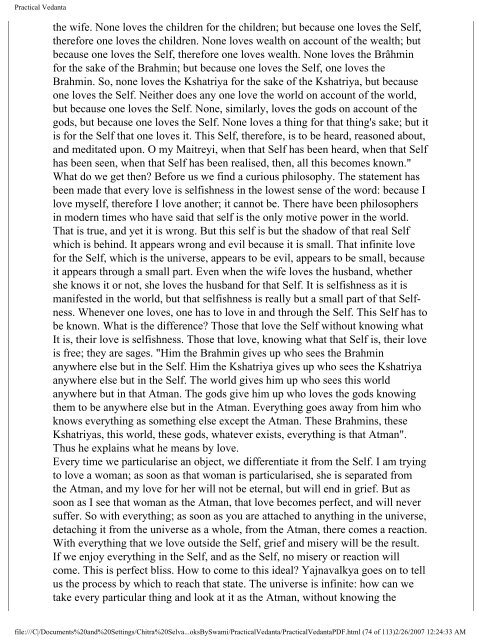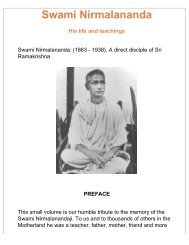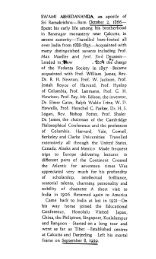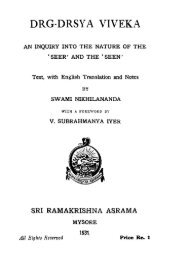<strong>Practical</strong> <strong>Vedanta</strong>the wife. None loves the children for the children; but because one loves the Self,therefore one loves the children. None loves wealth on account of the wealth; butbecause one loves the Self, therefore one loves wealth. None loves the Brâhminfor the sake of the Brahmin; but because one loves the Self, one loves theBrahmin. So, none loves the Kshatriya for the sake of the Kshatriya, but becauseone loves the Self. Neither does any one love the world on account of the world,but because one loves the Self. None, similarly, loves the gods on account of thegods, but because one loves the Self. None loves a thing for that thing's sake; but itis for the Self that one loves it. This Self, therefore, is to be heard, reasoned about,and meditated upon. O my Maitreyi, when that Self has been heard, when that Selfhas been seen, when that Self has been realised, then, all this becomes known."What do we get then? Before us we find a curious philosophy. The statement hasbeen made that every love is selfishness in the lowest sense of the word: because Ilove myself, therefore I love another; it cannot be. There have been philosophersin modern times who have said that self is the only motive power in the world.That is true, and yet it is wrong. But this self is but the shadow of that real Selfwhich is behind. It appears wrong and evil because it is small. That infinite lovefor the Self, which is the universe, appears to be evil, appears to be small, becauseit appears through a small part. Even when the wife loves the husband, whethershe knows it or not, she loves the husband for that Self. It is selfishness as it ismanifested in the world, but that selfishness is really but a small part of that Selfness.Whenever one loves, one has to love in and through the Self. This Self has tobe known. What is the difference? Those that love the Self without knowing whatIt is, their love is selfishness. Those that love, knowing what that Self is, their loveis free; they are sages. "Him the Brahmin gives up who sees the Brahminanywhere else but in the Self. Him the Kshatriya gives up who sees the Kshatriyaanywhere else but in the Self. The world gives him up who sees this worldanywhere but in that Atman. The gods give him up who loves the gods knowingthem to be anywhere else but in the Atman. Everything goes away from him whoknows everything as something else except the Atman. These Brahmins, theseKshatriyas, this world, these gods, whatever exists, everything is that Atman".Thus he explains what he means by love.Every time we particularise an object, we differentiate it from the Self. I am tryingto love a woman; as soon as that woman is particularised, she is separated fromthe Atman, and my love for her will not be eternal, but will end in grief. But assoon as I see that woman as the Atman, that love becomes perfect, and will neversuffer. So with everything; as soon as you are attached to anything in the universe,detaching it from the universe as a whole, from the Atman, there comes a reaction.With everything that we love outside the Self, grief and misery will be the result.If we enjoy everything in the Self, and as the Self, no misery or reaction willcome. This is perfect bliss. How to come to this ideal? Yajnavalkya goes on to tellus the process by which to reach that state. The universe is infinite: how can wetake every particular thing and look at it as the Atman, without knowing thefile:///C|/Documents%20and%20Settings/Chitra%20Selva...oksBySwami/<strong>Practical</strong><strong>Vedanta</strong>/<strong>Practical</strong><strong>Vedanta</strong>PDF.html (74 of 113)2/26/2007 12:24:33 AM
<strong>Practical</strong> <strong>Vedanta</strong>Atman? "As with a drum when we are at a distance we cannot catch the sound, wecannot conquer the sound; but as soon as we come to the drum and put our handon it, the sound is conquered. When the conch-shell is being blown, we cannotcatch or conquer the sound, until we come near and get hold of the shell, and thenit is conquered. When the Vina is being played, when we have come to the Vina,we get to the centre whence the sound is proceeding. As when some one isburning damp fuel, smoke and sparks of various kinds come, even so, from thisgreat One has been breathed out knowledge; everything has come out of Him. Hebreathed out, as it were, all knowledge. As to all water, the one goal is the ocean;as to all touch, the skin is the one centre; as of all smell, the nose is the one centre;as of all taste, the tongue is the one goal; as of all form, the eyes are the one goal;as of all sounds, the ears are the one goal; as of all thought, the mind is the onegoal; as of all knowledge, the heart is the one goal; as of all work, the hands arethe one goal; as a morsel of salt put into the sea-water melts away, and we cannottake it back, even so, Maitreyi, is this Universal Being eternally infinite; allknowledge is in Him. The whole universe rises from Him, and again goes downinto Him. No more is there any knowledge, dying, or death." We get the idea thatwe have all come just like sparks from Him, and when you know Him, then yougo back and become one with Him again. We are the Universal.Maitreyi became frightened, just as everywhere people become frightened. Saidshe, "Sir, here is exactly where you have thrown a delusion over me. You havefrightened me by saying there will be no more gods; all individuality will be lost.There will be no one to recognise, no one to love, no one to hate. What willbecome of us?" "Maitreyi, I do not mean to puzzle you, or rather let it rest here.You may be frightened. Where there are two, one sees another, one hears another,one welcomes another, one thinks of another, one knows another. But when thewhole has become that Atman, who is seen by whom, who is to be heard bywhom, who is to be welcomed by whom, who is to be known by whom?" Thatone idea was taken up by Schopenhauer and echoed in his philosophy. Throughwhom we know this universe, through what to know Him? How to know theknower? By what means can we know the knower? How can that be? Because inand through that we know everything. By what means can we know Him? By nomeans, for He is that means.So far the idea is that it is all One Infinite Being. That is the real individuality,when there is no more division, and no more parts; these little ideas are very low,illusive. But yet in and through every spark of the individuality is shining thatInfinite. Everything is a manifestation of the Atman. How to reach that? First youmake the statement, just as Yajnavalkya himself tells us: "This Atman is first to beheard of." So he stated the case; then he argued it out, and the last demonstrationwas how to know That, through which all knowledge is possible. Then, last, it isto be meditated upon. He takes the contrast, the microcosm and the macrocosm,and shows how they are rolling on in particular lines, and how it is all beautiful."This earth is so blissful, so helpful to every being; and all beings are so helpful tofile:///C|/Documents%20and%20Settings/Chitra%20Selva...oksBySwami/<strong>Practical</strong><strong>Vedanta</strong>/<strong>Practical</strong><strong>Vedanta</strong>PDF.html (75 of 113)2/26/2007 12:24:33 AM
- Page 1 and 2:
Practical VedantaPractical VedantaP
- Page 3 and 4:
Practical Vedantaworld. If I am a s
- Page 5 and 6:
Practical Vedantadifference is only
- Page 7 and 8:
Practical VedantaThe ideal of faith
- Page 9 and 10:
Practical Vedantamoment of our live
- Page 11 and 12:
Practical Vedantaof the Christs and
- Page 13 and 14:
Practical Vedanta"This life is Brah
- Page 15 and 16:
Practical Vedantadark fifteen days,
- Page 17 and 18:
Practical Vedantalife. This is the
- Page 19 and 20:
Practical Vedantaeverything would b
- Page 21 and 22:
Practical Vedantait is only through
- Page 23 and 24: Practical Vedantawhich is that subt
- Page 25 and 26: Practical Vedantanoumenon and pheno
- Page 27 and 28: Practical Vedantato which is the be
- Page 29 and 30: Practical VedantaAbsolute.The finit
- Page 31 and 32: Practical Vedantawhich is not the q
- Page 33 and 34: Practical Vedantaexperience that th
- Page 35 and 36: Practical Vedantafulfilled. The Jiv
- Page 37 and 38: Practical Vedantabetween the pure r
- Page 39 and 40: Practical Vedantacome out straight.
- Page 41 and 42: Practical Vedantawar with one anoth
- Page 43 and 44: Practical Vedantanobody could under
- Page 45 and 46: Practical VedantaMy idea, therefore
- Page 47 and 48: Practical Vedantathe same methods.
- Page 49 and 50: Practical Vedantavarious minds, all
- Page 51 and 52: Practical Vedantabrotherhood; but t
- Page 53 and 54: Practical Vedantabrotherhood, but w
- Page 55 and 56: Practical Vedantawe all go with ves
- Page 57 and 58: Practical Vedantareason. What can y
- Page 59 and 60: Practical Vedantabeen preached in t
- Page 61 and 62: Practical Vedantathe husband kisses
- Page 63 and 64: Practical Vedantaof the knowledge a
- Page 65 and 66: Practical Vedantafor those who only
- Page 67 and 68: Practical Vedantasun exists because
- Page 69 and 70: Practical Vedantaof death was pleas
- Page 71 and 72: Practical VedantaGod. We must learn
- Page 73: Practical Vedantaa plague comes, it
- Page 77 and 78: Practical Vedantathat immortal One,
- Page 79 and 80: Practical Vedantaand the third egoi
- Page 81 and 82: Practical VedantaWitness of the uni
- Page 83 and 84: Practical VedantaPractical Vedanta1
- Page 85 and 86: Practical Vedantaeternal ; every ot
- Page 87 and 88: Practical Vedantafaculty, Buddhi, w
- Page 89 and 90: Practical VedantaPractical Vedanta1
- Page 91 and 92: Practical Vedantastepping-stone to
- Page 93 and 94: Practical Vedantarecognition? Findi
- Page 95 and 96: Practical Vedantasentient." This is
- Page 97 and 98: Practical Vedantaessentially differ
- Page 99 and 100: Practical Vedantaexistence is limit
- Page 101 and 102: Practical Vedantalive, for I am lif
- Page 103 and 104: Practical Vedantasee from Kapila's
- Page 105 and 106: Practical Vedantalimitation, but th
- Page 107 and 108: Practical Vedantaperfect, infinite,
- Page 109 and 110: Practical Vedantaindividuality, of
- Page 111 and 112: Practical Vedantarepeat [something]
- Page 113: Practical Vedantaperson who dies in
















